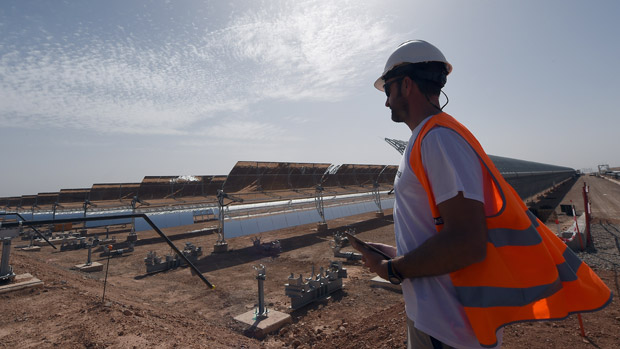Will UK homes soon be powered by Tunisian sunshine?
An 'ambitious' new plan could see the UK importing cheap solar energy from North Africa by 2018

A free daily email with the biggest news stories of the day – and the best features from TheWeek.com
You are now subscribed
Your newsletter sign-up was successful
Investors have approached the government for funding to help import large amount of solar power from the Sahara desert in North Africa.
The proposed plan has been developed by the joint-venture project TuNur, which believes that up to 2.5 million UK homes could be powered by solar energy from Tunisia by 2018, the BBC reports.
New legislation means foreign companies are now allowed to tender for contracts to bring renewable energy to the UK. TuNur is a partnership between two British renewables investment companies and private Tunisian investors who have already spent £10m on the project.
The Week
Escape your echo chamber. Get the facts behind the news, plus analysis from multiple perspectives.

Sign up for The Week's Free Newsletters
From our morning news briefing to a weekly Good News Newsletter, get the best of The Week delivered directly to your inbox.
From our morning news briefing to a weekly Good News Newsletter, get the best of The Week delivered directly to your inbox.
How will the TuNur project work?
The ambitious plan involves importing solar power to the UK from the sun-rich deserts of North Africa. The power will be captured by hundreds of thousands of solar panels in the Tunisian desert and transported to the UK, via Italy, along underground cables. Its developers say the project will deliver two gigawatts of solar power to the UK – more than a nuclear power plant could provide.
What are the advantages of the project?
Developers say it will provide consumers in the UK with power that is 20 per cent cheaper than home-grown renewable energy. Its supporters also say it will place the UK at the forefront of the fight against climate change and help both economies grow within greenhouse gas emission limits, Reuters reports.
A free daily email with the biggest news stories of the day – and the best features from TheWeek.com
"The Sahara offers every advantage you want - proximity to Europe, virtually no population and more intense sunlight," said George Joffe, a research fellow and regional expert at Cambridge University, who is not affiliated to the plan. "It would be mad to pass up this opportunity."
Is it realistic then?
"This is not a back-of-the-envelope fantasy," said Kevin Sara, chief executive of TuNur. "We are working with some of the largest engineering firms in the world. This is a serious project. Yes, it is risky like any big energy project."
But the competition at home is sceptical, partly because of issues of energy security. "The very last thing we need is the additional medium-term uncertainty that would be created," said Seb Berry from Solarcentury, the UK's leading solar energy firm. Others warn that political instability in the region is likely to disrupt the project.
-
 6 of the world’s most accessible destinations
6 of the world’s most accessible destinationsThe Week Recommends Experience all of Berlin, Singapore and Sydney
-
 How the FCC’s ‘equal time’ rule works
How the FCC’s ‘equal time’ rule worksIn the Spotlight The law is at the heart of the Colbert-CBS conflict
-
 What is the endgame in the DHS shutdown?
What is the endgame in the DHS shutdown?Today’s Big Question Democrats want to rein in ICE’s immigration crackdown